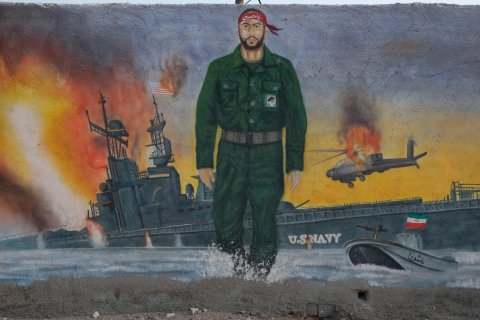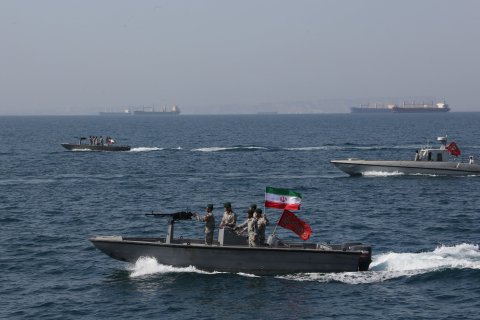to what extent did us technological superiority in the vietnam war condemn it to defeat
The U.s. is widely cited every bit the world's foremost military power, only the country has a spotty record when information technology comes to asymmetrical warfare. At present-infamous state of war games conducted nearly 17 years ago showed a maritime matchup against tactics like to those of Iran would likely prove extremely deadly for the Navy.
A new wave of tensions betwixt longtime foes Washington and Tehran was set off past alleged reports of Islamic republic of iran pursuing new missile activity in the region, just as information technology prepared to commemorate the U.Due south.' unilateral pullout from a 2015 nuclear deal by stepping back from some of its own commitments to the historic agreement. Amidst these declared threats were satellite imagery purporting to show pocket-size traditional sailing vessels known every bit dhows beingness fitted with cruise missiles.
Iran's ambassador to the Un Majid Takht Ravanchi dismissed these assessments, telling CBS News on Friday that "we do not fire missiles out of modest boats." He rejected such "faux intelligence" equally deliberate attempts to gear up the pretext for conflict—non different the false claims that led up to the 2003 invasion of Iraq.
Iran's two maritime forces—its conventional navy and the navy of the elite Revolutionary Guards—do, however, maintain a missile-equipped fleet of fast attack craft that information technology claims could take out even the most advanced U.S. warships although some have dismissed the capabilities of such assets. In a mixed figurer and live-burn down simulation in 2002, a "Red Squad" armed with vessels and strategies not unlike those known to be employed past Iran one time pummeled a "Blue Team" representing the U.S. to the bespeak where the Pentagon needed to step in to ensure a friendly victory.

The U.South. was already on the path to state of war with Iraq in 2002, after it accused the state of possessing weapons of mass destructions and threatening regional stability through missile activity and back up for militant groups. From July 24 through August xv, the since-dismantled Joint Forces Command conducted a $250 meg dollar practice known as Millennial Challenge that pitted the U.South.' Blue Team led by Ground forces General Lieutenant General Burwell B. Bong Iii against a Cerise Team representing an oil-rich Persian Gulf nation, near associated with either Iran or Republic of iraq, but in actuality led by retired Marine Corps Lieutenant General Paul Van Riper.
Despite being significantly outgunned by a much more technologically-advanced adversary, Van Riper launched a massive daze prowl missile salvo that overwhelmed the Blue Team' Aegis Ballistic Missile Defense System radars, sinking a meaning portion of what was the equivalent to a strike carrier group. He so led a shock guerilla-like assail of fast set on craft that finished off much of what remained using missiles and suicide charges.
As Micah Zenko recounted in his 2015 book Ruddy Squad: How to Succeed by Thinking Like the Enemy, Bell admitted that Van Riper's forces had "sunk my damn navy," and had inflicted "an extremely high rate of attrition, and a disaster, from which we all learned a great lesson."
Rather than concede the losses, however, the Pentagon'south command team overseeing the exercise simply chose to bring the fallen dorsum to life then further artificially constrain the Red Team's abilities in a way that it could not mayhap succeed, a disgruntled Van Riper after recounted in a private e-postal service leaked by the Ground forces Times. "Instead of a free-play, 2-sided game," he argued, "it but became a scripted exercise."
While the Pentagon justified its determination by wanting to use the full extent of what was a costly, circuitous undertaking involving multiple real-life U.S. forces that had been scheduled to appear in the war games, many felt the "great lesson" was lost every bit casualties mounted during the Republic of iraq State of war. Speaking to Newsweek simply two weeks after the 2003 invasion, the late U.S. career diplomat and Carmine Squad civilian leader for Millennial Claiming 2002 Robert Oakley said Pentagon officials "felt that it was unimportant," something he felt was a fault.
Oakley warned of a U.S. "temptation to overestimate our sophistication, our superiority in technology, our superiority in weapons"—citing examples in Vietnam and Lebanon. "I retrieve we do this often. We get carried away by our weapons, firepower, superiority, technology, all this kind of stuff, and we fail to wait at the homo factor. People will wait for a chink in our armor, the same mode David found a chink in Goliath's armor."

Fast forward 16 years—during which the U.South. has seen its troops only further entrenched in more murky post-9/eleven conflicts—Arkansas Senator Tom Cotton told PBS on Tuesday that the U.S. would defeat Islamic republic of iran in "2 strikes"—"the beginning strike and the last strike." Many other officials and experts disagreed, every bit Cotton'southward assessment came despite the fact that Iran was a much larger land, with the Middle Due east's largest continuing ground forces and missile armory, every bit well every bit countless Shiite Muslim militia fighters aligned to its revolutionary Shiite Muslim ideology across the region.
While many have compared the Trump assistants's Iran approach to that of onetime President George Due west. Bush-league's ahead of the Republic of iraq War—including the hawkish influence of John Bolton—both Trump and various Iranian leaders have expressed the fact that they did not seek a war between their 2 countries.
Notwithstanding, the White House's conclusion to unilaterally go out the landmark 2015 nuclear bargain has left Tehran skeptical of further affairs and Newsweek confirmed a National Security Council meeting last calendar week in which Interim Defense Secretary Patrick Shanahan drew up offensive and retaliatory military options for Iran at Bolton'south request, farther escalating an already tense situation in the Persian Gulf.
Source: https://www.newsweek.com/us-defeat-iran-war-navy-1429348
0 Response to "to what extent did us technological superiority in the vietnam war condemn it to defeat"
Post a Comment